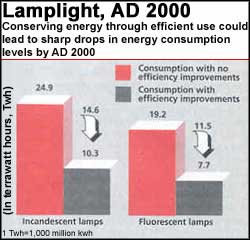The sun comes cheaper
 Electric geysers, common in metropolises, are an exorbitant way to heat bathwater. Although most developed countries use piped gas or fuel oil to heat water, oil-poor developing obviously can't on any affordable scale.
Electric geysers, common in metropolises, are an exorbitant way to heat bathwater. Although most developed countries use piped gas or fuel oil to heat water, oil-poor developing obviously can't on any affordable scale.
Cheaper alternatives for them are solar water heaters, piped natural gas, or gas from biomass combustion, of which the first is costs least and is most generous. Simple technology and inexpensive materials can be used to raise the temperature of water to 60oC -- ideal for India's winter, when hot water is most in demand and sunlight out in full blast without much cloud cover.
Despite subsidies to these devices, their demand growth is just inching along in the domestic sector. To bring things to a boil, the government has now made the installation of solar hot water systems mandatory in public buildings.
Related Content
- Energy efficient air conditioners become cheaper this summer
- Comparing electricity production costs of renewables to fossil and nuclear power plants in G20 countries
- Ghanaian invents cheaper way of building houses
- The US coal crash: evidence for structural change
- The global renewable energy boom: how Australia is missing out
- Renewables: the only path to a secure, affordable and climate-friendly energy system by 2030
